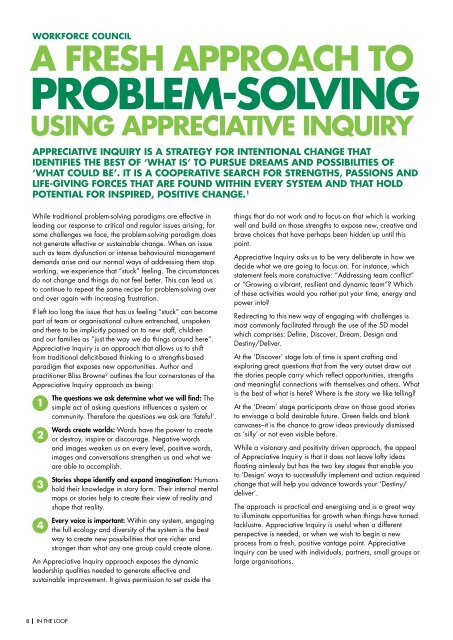Autumn 2015
You also want an ePaper? Increase the reach of your titles
YUMPU automatically turns print PDFs into web optimized ePapers that Google loves.
WORKFORCE COUNCIL<br />
A FRESH APPROACH TO<br />
PROBLEM-SOLVING<br />
USING APPRECIATIVE INQUIRY<br />
APPRECIATIVE INQUIRY IS A STRATEGY FOR INTENTIONAL CHANGE THAT<br />
IDENTIFIES THE BEST OF ‘WHAT IS’ TO PURSUE DREAMS AND POSSIBILITIES OF<br />
‘WHAT COULD BE’. IT IS A COOPERATIVE SEARCH FOR STRENGTHS, PASSIONS AND<br />
LIFE-GIVING FORCES THAT ARE FOUND WITHIN EVERY SYSTEM AND THAT HOLD<br />
POTENTIAL FOR INSPIRED, POSITIVE CHANGE. 1<br />
While traditional problem-solving paradigms are effective in<br />
leading our response to critical and regular issues arising, for<br />
some challenges we face, the problem-solving paradigm does<br />
not generate effective or sustainable change. When an issue<br />
such as team dysfunction or intense behavioural management<br />
demands arise and our normal ways of addressing them stop<br />
working, we experience that “stuck” feeling. The circumstances<br />
do not change and things do not feel better. This can lead us<br />
to continue to repeat the same recipe for problem-solving over<br />
and over again with increasing frustration.<br />
If left too long the issue that has us feeling “stuck” can become<br />
part of team or organisational culture entrenched, unspoken<br />
and there to be implicitly passed on to new staff, children<br />
and our families as “just the way we do things around here”.<br />
Appreciative Inquiry is an approach that allows us to shift<br />
from traditional deficit-based thinking to a strengths-based<br />
paradigm that exposes new opportunities. Author and<br />
practitioner Bliss Browne 2 outlines the four cornerstones of the<br />
Appreciative Inquiry approach as being:<br />
1<br />
2<br />
3<br />
4<br />
The questions we ask determine what we will find: The<br />
simple act of asking questions influences a system or<br />
community. Therefore the questions we ask are ‘fateful’.<br />
Words create worlds: Words have the power to create<br />
or destroy, inspire or discourage. Negative words<br />
and images weaken us on every level, positive words,<br />
images and conversations strengthen us and what we<br />
are able to accomplish.<br />
Stories shape identify and expand imagination: Humans<br />
hold their knowledge in story form. Their internal mental<br />
maps or stories help to create their view of reality and<br />
shape that reality.<br />
Every voice is important: Within any system, engaging<br />
the full ecology and diversity of the system is the best<br />
way to create new possibilities that are richer and<br />
stronger than what any one group could create alone.<br />
An Appreciative Inquiry approach exposes the dynamic<br />
leadership qualities needed to generate effective and<br />
sustainable improvement. It gives permission to set aside the<br />
things that do not work and to focus on that which is working<br />
well and build on those strengths to expose new, creative and<br />
brave choices that have perhaps been hidden up until this<br />
point.<br />
Appreciative Inquiry asks us to be very deliberate in how we<br />
decide what we are going to focus on. For instance, which<br />
statement feels more constructive: “Addressing team conflict”<br />
or “Growing a vibrant, resilient and dynamic team”? Which<br />
of these activities would you rather put your time, energy and<br />
power into?<br />
Redirecting to this new way of engaging with challenges is<br />
most commonly facilitated through the use of the 5D model<br />
which comprises: Define, Discover, Dream, Design and<br />
Destiny/Deliver.<br />
At the ‘Discover’ stage lots of time is spent crafting and<br />
exploring great questions that from the very outset draw out<br />
the stories people carry which reflect opportunities, strengths<br />
and meaningful connections with themselves and others. What<br />
is the best of what is here? Where is the story we like telling?<br />
At the ‘Dream’ stage participants draw on those good stories<br />
to envisage a bold desirable future. Green fields and blank<br />
canvases–it is the chance to grow ideas previously dismissed<br />
as ‘silly’ or not even visible before.<br />
While a visionary and positivity driven approach, the appeal<br />
of Appreciative Inquiry is that it does not leave lofty ideas<br />
floating aimlessly but has the two key stages that enable you<br />
to ‘Design’ ways to successfully implement and action required<br />
change that will help you advance towards your ‘Destiny/<br />
deliver’.<br />
The approach is practical and energising and is a great way<br />
to illuminate opportunities for growth when things have turned<br />
lacklustre. Appreciative Inquiry is useful when a different<br />
perspective is needed, or when we wish to begin a new<br />
process from a fresh, positive vantage point. Appreciative<br />
Inquiry can be used with individuals, partners, small groups or<br />
large organisations.<br />
8<br />
IN THE LOOP









